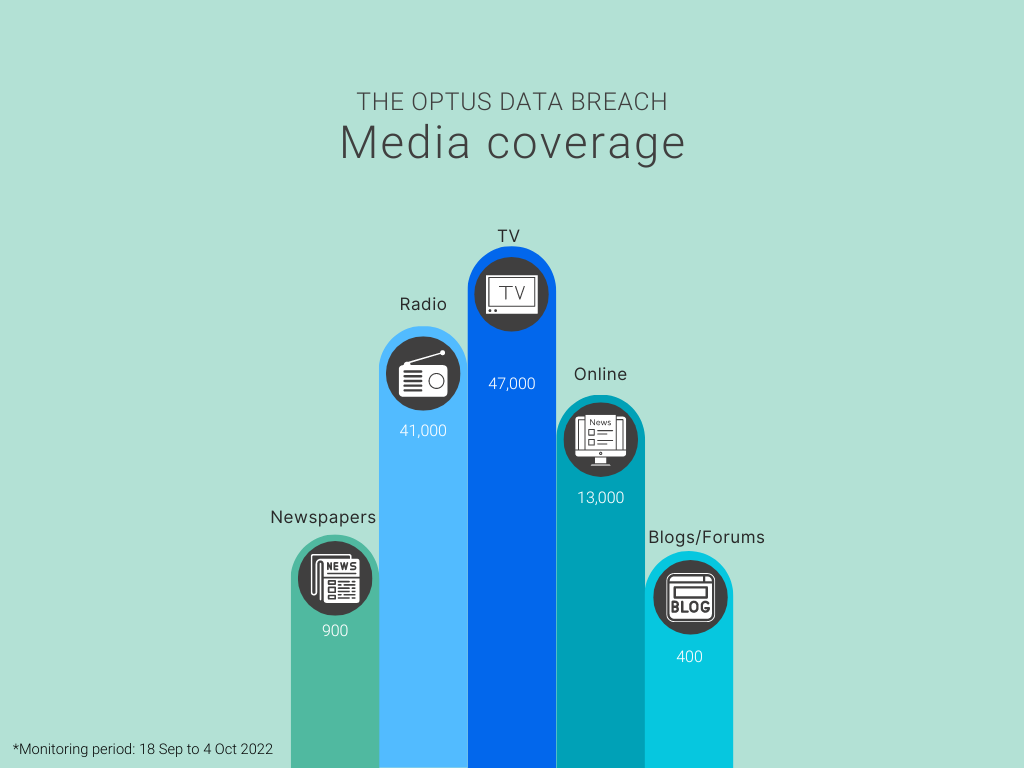Blog
Understanding journalism’s role in media brand equity
Explore how journalism shapes trust, audience engagement, and media influence in Australia and New Zealand.

In today’s fast-paced world, audience intelligence is critical to crisis management. By understanding who your target audience is and what they want, you can more effectively manage a crisis.
The constantly changing landscape of the internet and social media can make it difficult to stay ahead of the curve. Additionally, the vast amount of data available can be overwhelming and make it difficult to identify the most important information.
Getting a hold of the narrative in the media is crucial. It’s inevitable that at some point, your brand will receive negative press. Whether it’s a simple misunderstanding or a full-blown crisis, bad press can have a serious impact on your brand’s progress.

On 21 September 2022, there was a data breach of telecommunications company Optus where many of its customers’ information were compromised. In response, the company adopted a cautious and controlled approach in delivering its external communications.
However, the approach allowed the media as well as social media to swirl negative narratives about the company’s “inaction”. In the three weeks after the announcement that its databases had been hacked, there were more than 123,000 mentions of the company in the media.
In this instance, addressing a crisis quickly to minimize the impact on your business is critical. Seeing a spike in media coverage becomes a good barometer of how negative sentiment can escalate against your brand.
In another example, rising social media app BeReal suffered a shutdown in September 2022. The app focuses on users being authentic in their posts by prompting them to post pictures of themselves at random times of the day. With almost 15 million downloads of its app in September alone, the shutdown caused a stutter in its communications approach.

With a single tweet acknowledging the shutdown of its service, users were left puzzled as to what had happened. Media queries were left unanswered. This silence by the social media platform led to high-profile news sites such as Yahoo and TechCrunch covering the shutdown.
This is a highly risky communication approach in an extremely competitive market of social media platforms. Social media giant TikTok rolled out its version of BeReal while Instagram has begun testing the function.

The lack of transparency during a crisis such as a shutdown can lead to negative publicity and a loss of trust in the company. If users are not given clear information about why an app is shutting down, they may feel ‘lost’ and ultimately lose them as users.
While it’s impossible to completely avoid negative press, there are steps you can take to manage it and protect your brand’s reputation.
In the hyper-speed age of information-sharing and social media, it’s more crucial than ever to be open and honest with your audience.
When something goes wrong, don’t try to hide it – own up to it and let people know what you’re doing to fix the problem.
Being open and transparent will help build trust with your target audience and show that you are committed to making things right.
When a crisis strikes your competitor, there is no time to revel in their troubles. On another day, the crisis could happen to your brand and the scrutiny would be as intense as it was for your competitors.
Take notes of what is happening in the media and quickly facilitate actions to counter any possible scrutiny that might come your way. These actions must be part of your crisis management plan.
In the high-speed world of audience intelligence, crisis management is essential to protecting your brand. Rapid response and proactive communication are key to mitigating the damage of a negative event.
By monitoring the conversations online and identifying potential risks, you can take steps to prevent a crisis before it happens. If a crisis does occur, having a plan in place will help you quickly contain the situation and protect your organisation’s reputation.
Make sure you have a media monitoring function so that you can monitor the escalating spread of news. Additionally, a social media intelligence platform can identify topical discussions your target audience are engaged in.
Crisis management is the process by which an organisation deals with a major disruptive event. It’s critical to remember that in a crisis, your target audience is seeking reassurance and guidance on the issues.
Therefore, it’s essential that you don’t argue, trivialise or act defensively. Instead, you need to be calm, informative and decisive in your actions. This will help to instill confidence in your target audience and allay the media pressure to give you space to address the crisis.
The message you send out must be brief and informative in order to effectively manage the crisis. Getting involved in a large-scale debate is not advisable because it distracts your focus from finding solutions.
A brand crisis can be a very difficult situation to navigate. Your target audience is interested in what you are going to do next and what will happen to them. It’s important to keep your audience updated on what is happening and what you are doing to resolve the issue.
In the event of a crisis, it’s essential to quickly identify your key audiences and address their concerns. For a fast-moving consumer goods or a services organisation, the customer comes first because they are the primary audience of interest.
It also depends on what type of crisis it’s. If there is a workplace safety and security matter, it’s better to address your employees first and reassure them on resolving the crisis.
Ultimately, it’s best to identify key audiences and have various sources of information to implement this preemptive approach. From discovering communities in social media narratives to stakeholders of your business, keeping the flows of communication open is a priority.
In the event of a crisis, it’s essential to effectively communicate with the authorities and the media. Provide updates to the media and work with authorities to ensure that they are kept informed of the situation. By having a good relationship with them, the crisis is managed effectively and the negative impact on your business is minimised.
If you would like to learn more about media intelligence and how to use it for your crisis management strategy, get in touch with us today.
Loren is an experienced marketing professional who translates data and insights using Isentia solutions into trends and research, bringing clients closer to the benefits of audience intelligence. Loren thrives on introducing the groundbreaking ways in which data and insights can help a brand or organisation, enabling them to exceed their strategic objectives and goals.
Explore how journalism shapes trust, audience engagement, and media influence in Australia and New Zealand.
Discover what drives news stories to travel, spread, and shape brand perception.
Get in touch or request a demo.